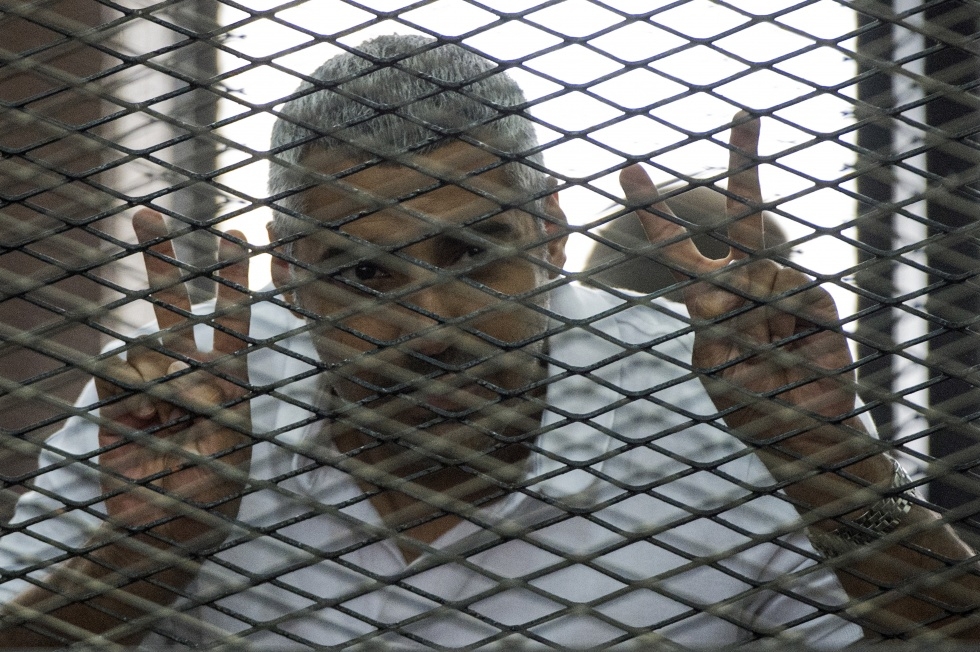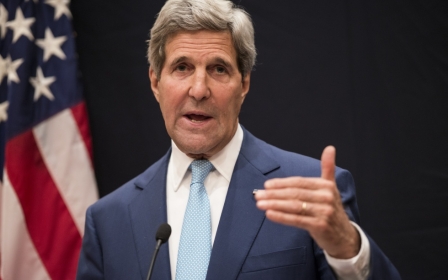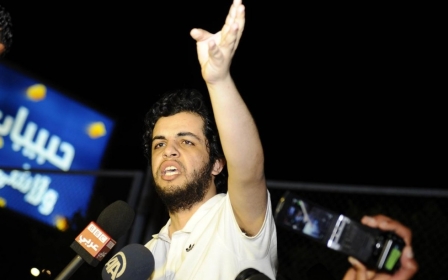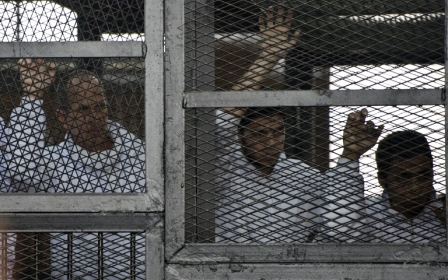Mohamed Fahmy: Jailed journalists ‘victims of a real ongoing cold war’

Egyptian-Canadian journalist Mohamed Fahmy has attributed his imprisonment to being “caught up in a web of coalitions and governments in the Middle East”, according to a new letter written from his Egyptian prison cell.
Fahmy, Cairo bureau chief for Al Jazeera English at the time of his arrest on 29 December 2013, was sentenced to seven years in prison in June for falsifying news and allegedly belonging to the outlawed Muslim Brotherhood movement.
AJE correspondent Peter Greste was also sentenced to seven years in jail, while producer Baher Mohamed received a ten-year sentence.
All have denied the allegations against them.
“The audacity of our case highlights the degree to which journalism and politics overlap in the realm of Arab media. We are victims of a real ongoing cold war between Egypt and Qatar,” Fahmy wrote.
In the letter, published by the Globe and Mail on Wednesday and scheduled to be read at the Canadian Journalists for Free Expression annual dinner that same day, Fahmy said that Egypt punished him and his colleagues in an effort to teach Qatar, which funds and is home to the Al Jazeera network, “a lesson for continuing to support the Muslim Brotherhood”.
“I am now more furious than ever that I am caught up in a web of coalitions and governments in the Middle East who can’t seem to agree on who the terrorists are, which camp to bomb first and which militant group to arm next,” he wrote.
‘Prisoners of conscience’
The journalists’ conviction marked a “dark day for media freedom in Egypt”, said Philip Luther, director for the Middle East and North Africa at Amnesty International. “They are prisoners of conscience and must be immediately and unconditionally released. In Egypt today anyone who dares to challenge the state’s narrative is considered a legitimate target.”
On November 24, Sarah Leah Whitson, executive director at Human Rights Watch, urged Canadian Prime Minister Stephen Harper to speak out “more forcefully” on Fahmy’s behalf to help secure his release.
“Canada should call forcefully and publicly for [Egyptian President Abdel Fattah] al-Sisi to take executive action to pardon and release Fahmy and his colleagues,” Whitson wrote.
Canada's Minister of State Foreign Affairs and Consular Services, Lynne Yelich, said she raised Fahmy's case with Egyptian authorities, and called on Egypt to "protect the rights of all individuals, including journalists" in a statement following the sentencing in June.
Fahmy did not condemn the Canadian government in his letter, instead saying that he was “convinced that bull-horn diplomacy and arm-twisting diplomatic rhetoric applied by other governments would not help” his case.
Still, he said that “there are essential lessons the Canadian government can learn from this ongoing crisis”, which he would discuss following his release from prison.
An appeals hearing in Fahmy and his colleague’s case is scheduled for 1 January, just over a year after they were first arrested.
New MEE newsletter: Jerusalem Dispatch
Sign up to get the latest insights and analysis on Israel-Palestine, alongside Turkey Unpacked and other MEE newsletters
Middle East Eye delivers independent and unrivalled coverage and analysis of the Middle East, North Africa and beyond. To learn more about republishing this content and the associated fees, please fill out this form. More about MEE can be found here.




